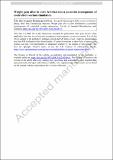Notice
This is not the latest version of this item. The latest version can be found at:https://dspace.mit.edu/handle/1721.1/142188.2
Weight gain after in vitro fertilization: a potential consequence of controlled ovarian stimulation
Author(s)
Bajaj, Simar S.; Jain, Bhav; Stanford, Fatima C.
Download10815_2022_2444_ReferencePDF.pdf (542.3Kb)
Publisher Policy
Publisher Policy
Article is made available in accordance with the publisher's policy and may be subject to US copyright law. Please refer to the publisher's site for terms of use.
Terms of use
Metadata
Show full item recordAbstract
Abstract
In the USA, 42% of adult women were estimated to have obesity, and 13% of women of childbearing age similarly have impaired fecundity. Obesity is associated with infertility such that patients with obesity often seek out in vitro fertilization (IVF) services. Here, we report on the case of a woman with childhood-onset class II obesity who had been undergoing treatment with phentermine and topiramate prior to undergoing 3 cycles of IVF. With each cycle, the patient temporarily gained 13–15 lbs. during controlled ovarian stimulation (COS). Weight gain from COS may be clinically relevant and merits further study to optimize weight status across women’s reproductive life and to better assist women who gain weight secondary to IVF. Incorporating weight monitoring into IVF protocols may also help better characterize the scope of weight gain from COS.
Date issued
2022-02-26Publisher
Springer US
Citation
Bajaj, Simar S., Jain, Bhav and Stanford, Fatima C. 2022. "Weight gain after in vitro fertilization: a potential consequence of controlled ovarian stimulation."
Version: Author's final manuscript